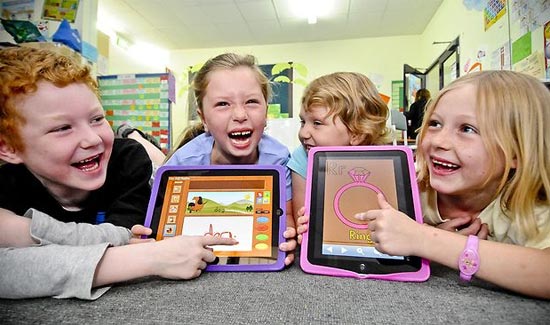
On 1 November 2016, we were joined by Sr. Tengku Nazatul Shima, a PhD researcher who is under the supervision of our lecturer Dr. Rozina, for a knowledge-sharing session. She is currently working on her thesis on the subject mentioned above; Mobile-Assisted Language Learning (MALL).
What is MALL?
As the name suggests, MALL aims to assist language learning through the medium of mobile devices. Meaning, it incorporates the use of mobile technologies which are the mobile phones and tablets into learning language which in this case is English.
From CALL to MALL
In the field of language learning, there is a branch close to MALL known as CALL: Computer-Assisted Language Learning. Historically, it can be said that MALL actually derives from CALL. CALL is different from MALL in a way that it applies language learning through computers including the desktops, notebooks and netbooks which are not so or even not at all mobile to be compared to the those used in MALL.
The question raised is that, why do teachers eventually decide to move from CALL to MALL? The answer has already been mentioned previously. Mobile phones and tablets are undeniably mobile or more mobile than computers, which means that in terms of practicality and ease, MALL wins. Other than that, mobile phones are extremely rampant today that hardly anyone can be found not owning a single mobile phone. Hence, it is easy to apply this everyday device in language learning without having to consider finding something that everybody has.
The pros and cons of MALL
Just as other teaching and learning approaches have their pros and cons, MALL is also not excluded from this. We have already mentioned why MALL is shifted from CALL, which has simultaneously described its pros, in a way. So what negative impacts can MALL bring then?
- Learners might go beyond the teachers’ control: With the advancement of technology and the fact that younger learners are more tech-savvy than the ‘older’ teachers, there are chances that while using the devices to learn the lesson, learners may sneak out into another realms of virtual reality out of the teachers’ supervision, especially if the class is quite big for a single teacher to attend to everyone.
- The original role of teachers might be questioned: Since the mobile devices plus other technologies have made learning language (and other subjects as well) more learner-centred, it raises question to the teachers’ role; do we still need teachers to teach the learners while learners can mostly learn on their own through the devices?
- Effects on health: Studies have shown that spending too much time on screen technologies (television, computer, tablet, mobile phone) may give unwanted consequences to both the physical and mental health of the users.
The list can still go a long way but these are among the prominent ones.
Strategies to succeed MALL
After considering the impacts that MALL might cause, researchers and learners do not stop just there. Strategies are brought forward for teachers to implement in effort to minimise if not totally diminish the impacts. The following strategies are taken to counter the consequences listed in the previous section.
- By hook or by crook, teachers must adapt themselves to the current technology and learn more about it so that there is something they can do through the devices to monitor the learners’ activities. Using applications that can ensure the learners’ attention to last longer and not spending too much time on the devices might also help coping this problem.
- According to Dr. Rozina, through her experience of teaching, learners have to and will rely on their teachers, despite of having the technology to self-learn. Perhaps this is due to the humane element in us on the need to socialise with other human beings face-to-face regularly. Additionally, it is actually up to the teachers how they intend to conduct the class; whether to let the learners rely 100% on the devices or to make sure the learning process is only assisted by the technology with the teacher’s primary role to teach.
- Though it is undeniable that prolonged use of screen technologies affect our health, we also have to accept the fact that it is also impossible to get rid of those technologies 100%. What we can do instead is to control the usage by minimising it. The teachers (and parents) are also responsible to regularly brief the learners on not spending too much screen-time due to its negative effects and the need to lead a healthy lifestyle.
At the end of the session, we were given the opportunity to experience MALL through an application she created. It was really fun and interactive, and no doubt kids would enjoy it and also benefit from it because even we ourselves, adult learners, also enjoyed it.
Thus, we can conclude that MALL has both the pros and cons. Still, we have to face the fact that technology is totally unavoidable today. Hence, it is the parents and teachers’ role to ensure the usage of mobile phones and other technology is being used appropriately so that we can benefit from technology at its most.
